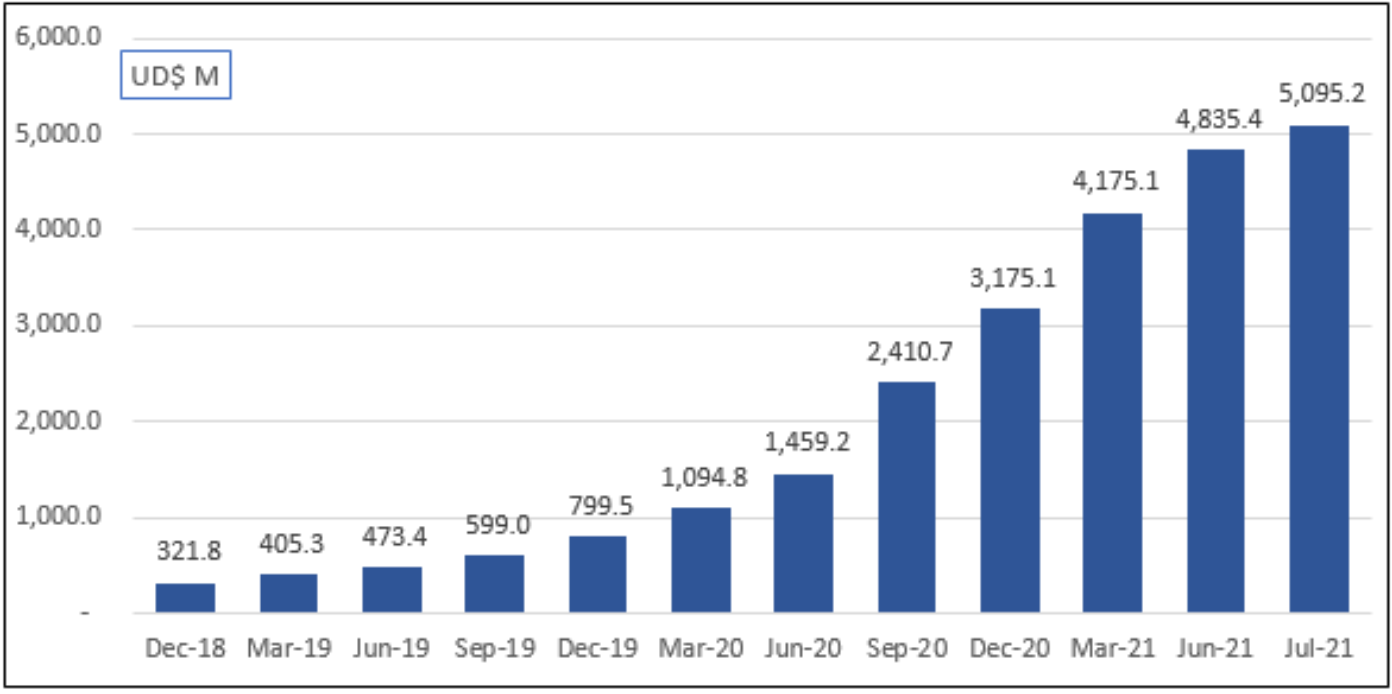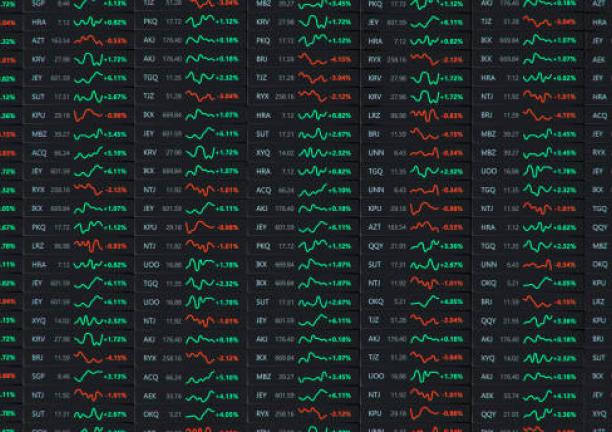The Bottom Line: New sustainable ETFs are thematic, equity-oriented, actively and passively managed, each emphasizing direct or indirect environmental considerations, subject to higher expense ratios.
Summary
Five new thematic actively and passively managed equity-oriented ETFs were launched in July 2021, each one emphasizing direct or indirect environmental considerations, either entirely or partially across their portfolios. As in June, there were no sustainable fixed income ETF launches in July. While offering some distinctive investing strategies, the funds lack a track record and, in some cases, charge higher or high expenses, with expense ratios ranging from 65 bps (iClima ETFs) and up to 109 bps (Direxion). The addition of five new equity-oriented ETFs brings the total number of sustainable ETFs to 153, according to Morningstar¹. These now consist of 136 equity-oriented funds covering a wide range of investment objectives and sustainable investing approaches, with $100.9 billion in net assets and 17 fixed income-oriented ETFs with about $5.1 billion in assets. While still a small segment, fixed income ETFs have been gaining traction. Sustainable fixed income ETFs only adding about $260 million in net assts during the latest month, but these investment vehicles have recorded a gain of $1.9 billion in net assets year-to-date, or a 60% uptick Sustainable fixed income ETFs posted an average total return of 0.87% in July versus an average return of 0.16% achieved by equity-oriented funds.
Observations and investor considerations
- Five thematic equity ETFs were listed in July, adding a total of $50.6 million in net assets. While their investment strategies vary, they all focus on the climate and the renewable energy theme that is expected to continue to lead the sustainable finance agenda, reinforced most recently by the just released Intergovernmental Panel on Climate Change (IPCC) report warning that steep greenhouse gas emissions reductions efforts are urgently needed by countries and governments if we are to limit warming to 1.5° Celsius in line with the most ambitious goals under the 2015 Paris Climate Agreement.
- The fundamental investment objectives of the newly launched funds range from miscellaneous equity to large cap equity to leveraged equity. Each of these ETFs pursues a thematic sustainable investing approach with a focus on climate and renewable energy. In addition, some of the funds also incorporate an exclusionary approach along with environmental, social and governance (ESG) screening. Refer to Table 1.
- While a total of $50.6 million in net assets were added by these new funds, one fund—Goldman Sachs Future Planet Equity ETF added $33.4 million and accounted for 66% of the total.
- The funds charge higher expense ratios, ranging from 65 (iClima ETFs) bps to 109 bps (Direxion) and because they are new, performance track records have not as yet been established for evaluation purposes. Investors interested in climate and renewable energy themes can choose from other available funds that are more seasoned and offered at lower expense ratios.
- The addition of five new equity-oriented ETFs brings the total number of ETFs to 153, according to Morningstar², with total net assets in the amount of $10.9 billion. Including new funds, equity-oriented ETFs added $2.6 billion in assets month-over-month.
- Still, fixed income ETFs have been gaining traction and while only adding about $260 million in net asstes during the latest month, fixed income ETFs have recorded an increase of $1.9 billion in net assets year-to-date, for a 60% gain. Fixed income ETFs posted an average total return of 0.87% in July versus an average return of 0.16% recorded by equity-oriented funds. Refer to Chart 1.
Chart 1: Sustainable fixed income ETFs growth in assets: December 2018 – July 30, 2021

Table 1: Listing of ETFs launched in July 2021 and their sustainable investing strategies
| Fund Name | Investment Adviser/Sub-adviser | TNA ($M) | Expense Ratio (bps) | Sustainable Investing Strategy/Approach |
| Direxion Daily Global Clean Energy Bull 2X Shares (KLNE) | Rafferty Asset Management LLC | 4.9 | 109 | Thematic investing fund. A leveraged trading vehicle that seeks to achieve 2X the performance of the S&P Global Clean Energy Index. The index tracks the performance of companies from developed markets whose economic fortunes are tied to the global clean energy business. |
| Goldman Sachs Future Planet Equity ETF# | Goldman Sachs Asset Management | 33.4 | 75 | Thematic investing fund. The fund intends to invest in companies that Goldman Sachs believes are aligned with the key themes associated with seeking to address environmental problems, which include, but are not limited to, clean energy, resource efficiency, sustainable consumption, the circular economy and water sustainability. Goldman may determine that an issuer is aligned with one or more of the key themes, even when the issuer’s profile reflects negative, or a mixture of positive and negative, environmental, social and governance characteristics. Goldman Sachs employs a fundamental investment process that may integrate ESG factors with traditional fundamental factors. No one factor or consideration is determinative in the stock selection process. |
| iClima Distributed Renewable Energy Transition Leaders ETF (SHFT) | Toroso Investments, LLC | 1.0 | 65 | Thematic investing fund. Seeks to track the performance of the Solactive GBS Global Markets All Cap USD Index TR that consists of large-, mid-, and small-capitalization segment in developed and emerging markets providing products and services that enable the practice of distributed energy generation which is decentralizing electrical supply services in favor of small, consumer specific sources of power at or near where it will be used (e.g., solar PV rooftop, microturbines, wind turbines, solar cells, etc.) in the following segments: Distributed power sources, distributed energy storage, vehicle-to-grid and electric vehicle charging, virtual power plants, microgrid and smart grids, and software and systems for distributed energy sources. The fund also employs exclusionary criteria and applies additional ESG screening. Refer to Notes of Explanation. |
| iClima Global Decarbonization Transition Leaders ETF (CLMA) | Toroso Investments, LLC | 2.1 | 65 | Thematic investing fund. Starting with the same Solactive GBS Global Markets All Cap USD Index TR universe of stocks, companies are selected based on metrics that quantify a company’s contribution to avoidance of carbon dioxide equivalents by offering climate change mitigation solutions (through products and/or services) that enable a function to be performed with lower carbon emissions. Companies in the index generate revenues in line with the most relevant existing climate change mitigation solutions that enable significant CO2 equivalents reductions through CO2 equivalents avoidance, improving energy efficiency and/or contributing to carbon sequestration (i.e., capturing and storing carbon dioxide). Companies from the following segments are selected: green energy, green transportation, water and waste improvements, enabling solutions, and sustainable products. The fund also employs exclusionary criteria and applies additional ESG screening. Refer to Notes of Explanation. |
| Viridi Cleaner Energy Crypto-Mining & Semiconductor ETF#(RIGZ) | Investment Adviser: Empowered Funds, LLC Investment Sub-Adviser: New Gen Minting, LLC dba Viridi Funds | 3.8 | 90 | The fund invests in (1) “clean energy” crypto mining industries, and (2) semiconductor industries. In this connection, the fund will not itself invest directly in cryptocurrencies but rather the fund invests in equity securities of companies that are market participants creating cryptocurrency themselves, or, so called miners. Using a proprietary methodology, the fund’s investments in miners will be evaluated and ranked by New Gen Minting on the basis of each miner’s energy profile with regard to certain clean energy criteria intended to reduce the negative environmental impacts of mining and promote environmental sustainability. In addition, the fund invests in the equity securities of companies in the semiconductor industries, focusing on those that develop or manufacture computer chips used in crypto-mining industries. Semiconductor companies will not be subject to the clean energy screening applicable to the mining companies. |
Notes of Explanation: # actively managed ETF. Sources: TNA and expense ratios: Morningstar Direct, Sustainable investing strategies: Fund prospectus and Sustainable Research and Analysis LLC. For further information regarding fund sustainable investing strategies, refer to fund prospectuses. Additional information regarding the sustainable investing approaches adopted by both iClima Distributed Renewable Energy Transition Leaders ETF and iClima Global Decarbonization Transition Leaders ETF/per their prospectus: Index components that generate revenue from certain activities are negatively screened and excluded from the list of companies eligible for inclusion in the index. Examples of such activities include: Oil exploration and production, companies in the microgrid and smart grids or software and systems segments with revenues from non-conventional weapons producers (e.g., nuclear weapons or systems, chemical or biological weapons, landmine, cluster bombs, or depleted uranium weapons). Concessions may be made to companies in the microgrid and smart grids or software and systems segment with revenues of less than 10% to conventional armament producers, energy producers that receive over 20% of their revenue from nuclear energy, power generators that are predominantly renewable energy players that receive 50% or more of their revenues from natural gas or more than 1% of their revenues from coal-fired power plants, and automotive makers that receive over 40% of their revenue from sales of automobiles with internal combustion engines. Companies are then subject to a final screening for inclusion in the index based on several additional indicators that provide additional evidence of relevant sustainability and environmental, social and governance aspects of their operations, namely climate and other environmental-related aspects, as well as social and employee aspects, including respect for human rights, anti-bribery and anti-corruption. These additional indicators are used to identify companies with practices that are in line with higher sustainability objectives and companies that are lagging in specific parameters. Additional exclusionary indicators are then applied, and companies determined to engage in activities involving forced and compulsory labor and/or child labor (as defined by the United Nations Global Compact, a corporate sustainability initiative) are excluded from the list of companies eligible for inclusion in the index.¹ In its classification of sustainable funds, Morningstar excludes ETFs and mutual funds managed by firms like JPMorgan, MFS, Eaton Vance and T. Rowe Price, to name some, that integrate ESG. These funds are also excluded from this analysis.² Refer to footnote 1.





